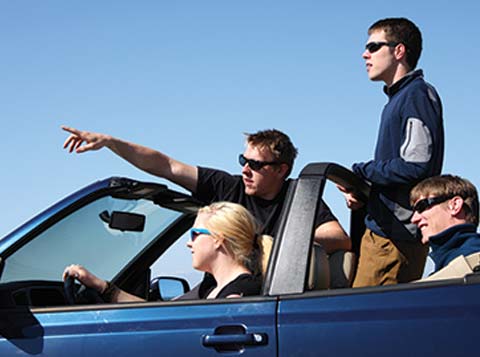
By Patrick M. Moreland
Rented or borrowed vehicles, or asking someone to drive on your church’s behalf, carries hefty liabilities. If that vehicle is involved in a serious “at-fault” accident, your church will likely be named in a lawsuit, along with the vehicle’s owner and driver.
 Examples of hired and non-owned auto use include:
Examples of hired and non-owned auto use include:
- A pastor asking the church’s administrative assistant to drive her own car to the office supply store
- Volunteers driving mobility-impaired members to and from worship services on Sunday
- Members transporting kids to a skating party
- Borrowing a member’s large van for a weekend church group retreat
- Renting a van to transport members, cross-country, to your denomination’s annual conference
Fortunately, in most cases, you don’t need to rely on the driver or vehicle owner to have adequate insurance to protect your church. Instead, your church can buy “hired and non-owned automobile” liability insurance — usually as an addition to your church’s multi-peril (property and liability) policy or commercial auto policy.
Hired and nonowned auto insurance provides liability protection for your church when you rent or borrow a vehicle for use on church business, and when vehicles owned and driven by your employees (or anyone else) are used on the job or on your church’s behalf. Your clergy, officers, employees and volunteers also are covered, if driving.
Typically, hired and non-owned auto insurance is an “excess” liability coverage, meaning it (1) applies after any other valid and collectible insurance is paid, and (2) covers bodily injury and property damage you cause others, but not damage to the vehicle you’re using. The vehicle’s owner is the first source of liability coverage, and the only source of coverage for damage to that vehicle. If the owner has no coverage, or it’s inadequate, the church’s hired and non-owned auto coverage steps in to provide liability protection, but does not cover damage to the vehicle you’re using.
Minor injuries to occupants of the hired or non-owned auto can be covered if the church has purchased “medical expense” coverage in conjunction with the hired and nonowned auto liability insurance.
A word about rental vehicles
There are important differences between a personal auto policy and a commercial auto policy — among them, coverage for vehicles you rent or borrow.
Don’t assume that because your church owns a vehicle and carries insurance on it, it will be covered when you rent or borrow a vehicle. While it’s common for the physical damage coverages of a personal auto policy to extend to rental vehicles, it’s far less common for a commercial auto policy to do so. You might very well need to buy the insurance offered by the rental agency, unless your insurance company offers specific coverage for rented vehicles.
When a doubt or question arises about your church’s coverage, check with your insurance agent before you rent or borrow a vehicle or ask someone to drive on behalf of your church.
Patrick M. Moreland, CPCU, CIC, CRM is vice president of marketing for Church Mutual Insurance Company in Merrill, WI.


